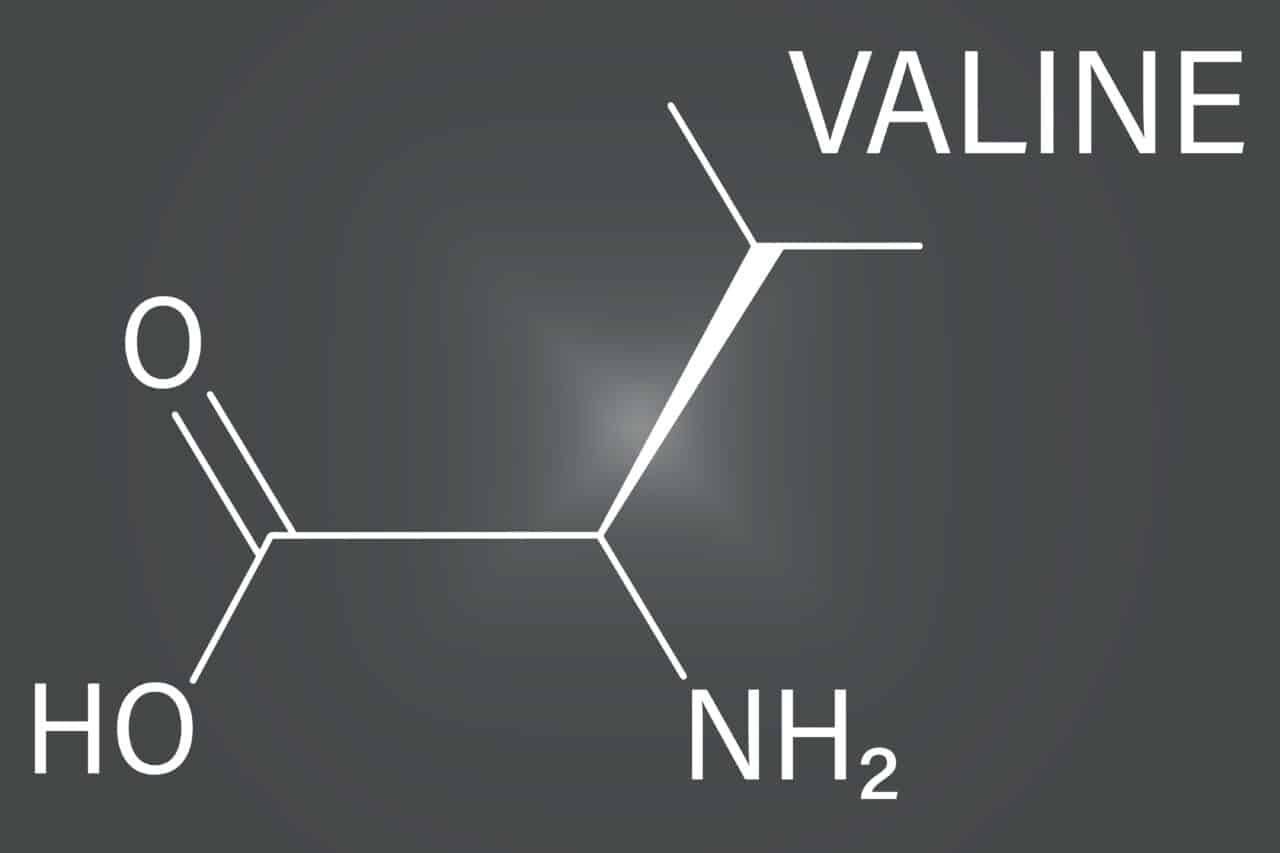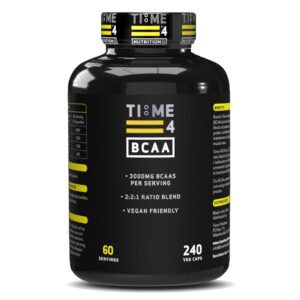What are BCAAs?
What are BCAAs? – Branch Chain Amino Acids
(Click On The Reference Numbers In Blue For More Info)
BCAAs (Branch Chain Amino Acids) are a popular supplement which have been studied as a therapeutic for a variety of muscle wasting disorders for more than half a century, but it is only since the 1980s that sports nutritionists have investigated their use to enhance performance. Although many people who train will be familiar with the term BCAA, few will really understand what they are and the many benefits they can provide, particularly if you participate in demanding exercise.
In this article, we are going to take an in-depth look at BCAAs (branch chain amino acids), and a selection of the research that supports their use. You’ll then begin to see why Time 4 BCAA is such a great product and how it may benefit you.
The structure and function of BCAAs
Amino acids are the ‘building blocks’ which combine to form the various proteins needed by the body for many important functions, including tissue growth and repair, and energy production.
20 amino acids have been identified in the human body which make up an estimated 2 million different types of proteins. Of these 20, 9 are referred to as ‘essential’ because they cannot be produced by the body and so must be obtained from dietary sources.
BCAAs (Branch Chain Amino Acids) belong to this group and are the most abundant amino acids found in proteins. They comprise leucine, isoleucine and valine, which make up approximately 1/3 of skeletal muscle protein and account for 40% of the total amino acids required by the body. They are grouped together because they all have a branched molecular structure and perform many similar functions.

Leucine
Leucine is important for protein synthesis and many other functions including the regulation of blood sugar levels, growth and repair of muscle and bone tissue, growth hormone production, and wound healing. It also prevents the breakdown of muscle proteins after trauma or severe stress. It is leucine which provides the signal to switch from a catabolic state to an anabolic state in which the body begins to rebuild muscle after training.

Isoleucine
Isoleucine is concentrated in muscle tissues in humans and has a range of functions, including regulating blood sugar and energy levels, assisting wound healing, stimulating immune function, promoting the secretion of several hormones, and haemoglobin production. It may also help to prevent the breakdown of muscle during exercise, and so enhance recovery.

Valine
Valine plays a role in muscle growth, tissue repair, and energy production. It also maintains mental vigour, muscle coordination, and emotional calm.
BCAAs and muscle
BCAAs have an anabolic effect on protein metabolism by increasing the rate of protein synthesis and decreasing the rate of protein breakdown. In addition, BCAAs are broken down to supply energy during fasting to help preserve muscle mass. Unlike most other amino acids, the initial breakdown of BCAAs does not take place in the liver but within skeletal muscle. This means that they increase rapidly in the bloodstream after they have been consumed and are readily available to tissues outside of the liver, such as muscle, which makes them critical for skeletal muscle anabolism, and ideally suited as a nutritional supplement targeting the muscles and brain.
More than just the building blocks of muscle
BCAAs are a special class of amino acids. In addition to playing a crucial role in stimulating skeletal muscle protein synthesis and suppressing the breakdown of muscle protein, they also play critical roles in the regulation of energy balance, ageing, food intake, the metabolism of glucose and fats, gut health, immunity and have been linked to the regulation of body weight. In addition, leucine is involved in the synthesis of cholesterol, and therefore, is important for cell membrane integrity and cellular communication.
What does the science say about BCAAs, exercise and performance?
Supplementation with BCAAs is supported by numerous scientific studies which demonstrate the wide variety of performance benefits it can provide. These include, but are not limited to:
- Increasing muscle mass (1, 2, 3, 4, 15, 16, 25)
- Increasing muscular strength (4, 16)
- Reducing exercise induced fatigue (5, 6, 7, 17, 20)
- Increasing endurance (17, 22)
- Enhancing immunity (19, 20)
- Reducing post-exercise muscle soreness (8, 9, 14, 15, 18, 19, 20)
- Enhancing recovery after strength training (10, 14, 15)
- Helping to prevent weight gain and aid fat loss (4, 11, 12, 13, 21)

The effects of BCAAs on muscle size and strength
Supplementation with BCAAs is perhaps most commonly associated with increases in muscle growth and strength, which is supported by a number of studies.
Jackman et al., (1) investigated the effects of BCAAs (Branch Chain Amino Acids) in isolation (i.e., without concurrent ingestion of other EAAS (Essential Amino Acids), intact protein, or other macronutrients) on muscle protein synthesis after resistance exercise. 10 young resistance-trained men completed 2 trials, consuming either BCAAs or a placebo drink immediately after training. The results showed that muscle protein synthesis was 22% higher after the consumption of the BCAA drink than the placebo. The authors concluded that consuming BCAAs alone increases post-exercise muscle protein synthesis.
Stoppani and colleagues (4) found that the consumption of BCAAs while following an 8-week resistance training programme produced a significant increase in muscle mass, and 10-Rep Max strength gains on the bench press and squat vs a sports drink. In addition, the consumption of BCAAs resulted in a greater decrease in body fat.
The results of a study by Shimomura et al., (15) showed that our need for BCAAs is increased by exercise. In addition, BCAA supplementation before and after exercise was shown to decrease exercise-induced muscle damage and promote muscle protein synthesis.
Aging is associated with a loss of muscle mass and function, and if severe enough, it is referred to as sarcopenia. This can have a profound impact on an individual’s functional ability and quality of life, as it can result in difficulty performing daily activities, inability to climb stairs, poor balance, and an increased risk of falls. Research shows that sarcopenia is associated with lower levels of BCAAs in the blood and a lower intake of protein (23). Consequently, it would seem logical that increasing an individual’s BCAA levels would have a positive effect on sarcopenia.
This hypothesis was tested by Ko et al., (16), who investigated the effects of short-term administration of BCAAs on subjects with pre-sarcopenia or sarcopenia. A BCAA supplement was consumed for 5 weeks followed by a discontinuation period of 12 weeks. The results showed that BCAAs improved muscle mass, walking speed, and grip strength at 5 weeks. However, these all declined progressively at 17 weeks, which suggest that the continued consumption of BCAAs is required to maintain the benefits of supplementation.

The effects of BCAAs on exercise induced fatigue and endurance
Fatigue is a major limiting factor for performance. Therefore, ways in which it can be reduced have been the subject of scientific investigation for many years. Recently, a number of studies have evaluated the influence of BCAAs on various aspects of fatigue and performance.
Bloomstrand et al., (6) investigated the effect of ingesting a solution of BCAAs on perceived exertion during exercise. The subjects exercised at approximately 70% of their maximal oxygen uptake for 60 minutes, followed by another 20 minutes of maximal exercise. During the exercise, the subjects were given either a solution of BCAAs or a placebo. The results showed the subjects ratings of perceived exertion were 7% lower when they were given BCAAs and their ratings of mental fatigue were 15% lower in comparison to the placebo. In addition, performance in a test of working memory and attention performed after exercise was improved when BCAAs had been ingested during exercise, compared to the placebo.
A study by Gualano and colleagues (7) evaluated the effects of BCAA supplementation on exercise capacity and lipid oxidation in glycogen-depleted subjects during exhaustive exercise. The results showed BCAA supplementation provided a 17.2% greater resistance to fatigue when compared to a placebo and increased oxidation of fat in conjunction with higher blood glucose levels
AbuMoh’d et al., (17) found that BCAA supplementation not only reduced fatigue, but also increased time to exhaustion to approximately 50 minutes during a treadmill exercise test in comparison to the average time of 46 minutes achieved with the placebo.
Matsumoto and colleagues (22) investigated the effects of BCAA supplementation on the lactate threshold as an index of endurance exercise capacity. Lactate threshold is the point at which the blood concentration of lactate begins to increase rapidly during exercise. Subjects consumed either a BCAA drink or a placebo for 6 days. On the 7th day, they performed a cycle ergometer test until exhaustion. The results showed that the respiratory exchange ratio was lower during the exercise test in the BCAA trial than in the placebo trial. This indicates that the body is using more fat as fuel, while a higher respiratory exchange ratio indicates that the body is using more carbohydrates. In addition, the subjects’ maximum rate of oxygen uptake (VO2max) was higher in the BCAA trial than in the placebo group. The authors concluded that results demonstrate BCAAs’ ability to increase the endurance exercise capacity.

The effects of BCAAs on post-exercise muscle soreness and recovery
Post-exercise muscle soreness can not only literally be a pain and an inconvenience, but can also lead to muscle fatigue and short-term loss of strength, thereby reducing muscle function and performance. As BCAAs’ role in stimulating muscle protein synthesis and decreasing muscle protein breakdown are well established, it seems logical that they may also play a role in attenuating muscle soreness and the loss of strength and power that often occurs post-exercise.
Shimomura and colleagues (9) evaluated the effect of BCAA supplementation on squat-exercise-induced delayed-onset muscle soreness (DOMS). In the morning of the exercise day, the participants ingested either BCAAs or a placebo before performing 7 sets of 20 squats with 3-minute recovery intervals between sets. DOMS showed a peak on days 2 and 3 in both trials, but the level of soreness was significantly lower in the BCAA trial than in the placebo. BCAA supplementation also reduced the decrease in muscle-force associated with DOMS by 20% to approximately 80% of the value observed in the placebo trial. Plasma BCAA concentrations, which decreased after exercise in the placebo trial, were markedly elevated during the 2 hours post exercise in the BCAA trial. It is important to note that consuming muscle building amino acids, especially leucine, in the time immediately after and up to 2 hours post exercise is generally accepted to provide a significant increase in muscle protein synthesis. In addition, levels of myoglobin in the blood (a marker of muscle injury) were increased by exercise in the placebo trial but not in the BCAA trial.
A study by Howatson et al., (14) examined the effects of BCAA supplementation on markers of muscle damage caused by a bout of exercise (100 consecutive drop-jumps). The results showed a significant reduction in muscle soreness in the BCAA group compared to the placebo. Furthermore, the recovery of maximum strength was also significantly greater in the BCAA group. The authors concluded that BCAAs administered before and following damaging resistance exercise reduces muscle damage and accelerates recovery. They suggest that the BCAAs provided greater availability of substrate to improve protein synthesis and thereby reduce the extent of secondary muscle damage associated with strenuous resistance exercise.
Fedewa and colleagues (18) assessed the results of 42 peer-reviewed studies that employed a randomised control design, considered to be the ‘gold standard’ in research, to compare the effects of BCAAs to a placebo on post-exercise muscle soreness. The results showed that supplementation with BCAAs produced a large decrease in post-exercise muscle soreness compared to a placebo.
A study by Gee and Deniel (10) showed that consuming BCAAs acutely before and following intensive strength training, reduces the decrease in power-producing ability experienced after strength training. In light of these results, the authors suggest that BCAAs are an effective ergogenic aid for athletes who need to enhance the recovery of their power-producing ability following intensive strength training.
Periods of demanding exercise with insufficient recovery increase the risk of ‘overtraining’, which is not only associated with a decrease in performance, but also numerous other negative effects such as a reduction in the anabolic hormone, testosterone, and an increase in the catabolic hormone, cortisol. Carwyn and colleagues (24) evaluated the ability of BCAA supplementation to maintain short-term anabolic hormone levels and decrease muscle damage during a period of high-intensity resistance training. Subjects consumed either a BCAA supplement or a placebo for 3 weeks before commencing a 4th week of supplementation accompanied by high-intensity whole-body resistance training. The results showed that serum testosterone levels were significantly higher in the BCAA group while cortisol and creatine kinase levels, a marker of muscle tissue damage, were significantly lower during and following resistance training.
These findings show that BCAAs produce a positive effect on anabolic hormone levels while reducing training-induced increases in muscle tissue damage. The authors suggest that athletes should increase their amino acid intake to reflect the increased need for recovery during periods of demanding training, which can increase performance while decreasing the risk of injury or illness.

The effect of BCAAs on immunity
Our immune system is fundamental to our health, wellbeing and ultimately, our ability to train and reach peak levels of fitness and performance. Although exercise typically has a positive effect on immune function, participation in repeated bouts of strenuous exercise can result in immune dysfunction, increasing the risk of illness.
Many supplements have been proposed to support the immune system with varying levels of effectiveness. Now evidence is beginning to emerge which demonstrates BCAAs’ ability to enhance immune function, particularly for those engaged in demanding exercise.
Negro et al., (19) found that in addition to aiding recovery and reducing muscle soreness, supplementation with BCAAs also had a positive impact on immune function by increasing certain types of immune cells in response to exercise. This led the authors to conclude that BCAAs are a useful supplement for both muscle recovery and immune regulation in athletes.
A review by Salinas-García and colleagues (20) investigated the effects of branch amino acids in endurance sports. 14 papers were included, and like the study by Negro et al., (19), the results showed that supplementation with BCAAs improved the immune response of athletes, in addition to reducing pain and muscle damage, perceived exertion and mental fatigue, and producing a greater anabolic response during recovery.
The effects of BCAAs on body fat
Although the beneficial effects of BCAAs on muscle are well established, less well known are the beneficial effects of BCAA supplementation on body fat, which have been demonstrated in both animal and human studies.
Qin and colleagues (11) investigated the association between dietary BCAA intake and risk of overweight status/obesity among multi-ethnic populations. The study involved 4,429 men and women ages 40-59 years. Analysis showed BCAA intake and obesity were inversely related. That is, a higher dietary BCAA intake is associated with lower prevalence of being overweight or obese.
A study by Li et al., also found a higher ratio of dietary BCAA is inversely associated with prevalence of obesity. In addition, the results showed that a higher intake of BCAAs was associated with lower glucose levels 2 hours after eating.
Although there is evidence to show that a higher intake of BCAAs is related to a reduced risk of becoming overweight or obese, can BCAAs help us to reduce body fat?
An interesting study by Mourier et al., (13) investigated the effects of a number of dietary interventions on the body composition and exercise performance of elite wrestlers.
Subjects consumed either a hypocaloric (low calorie) control diet, hypocaloric high-protein diet, hypocaloric high BCAAs diet or hypocaloric low-protein diet for a period of 19 days. The results showed that the hypocaloric BCAAs diet produced the greatest reduction in body weight (-4 kg) and the greatest decrease in body fat percentage (-17.3%). It also produced a significant reduction in abdominal fat (-34.4%), and allowed a high level of performance to be maintained.
The results of a review by Mero (21) also found that BCAA supplementation in combination with moderate energy restriction produced a significant and preferential loss of abdominal fat and allowed a high level of performance to be maintained.

Why Time 4 BCAA?
Time 4 BCAA is a high strength 2:2:1 ratio of L-Leucin, L-Isoleucin, and L-Valine, which can be absorbed quickly by the body. This is essential for optimum recovery and muscle growth, especially when taken immediately before and after training.
Although all of the BCAAs play important roles within the body, leucine has the greatest influence on our ability to build muscle protein because it provides the signal to switch to an anabolic state. The quicker your body receives this signal after training, the sooner it switches from breaking muscle down to building and repairing it to ensure a full and speedy recovery. So important is leucine, the International Institute of Sport’s Nutrition’s make specific reference to this single amino acid in its position stand on protein intake and exercise. This recommends that athletes wishing to maximise muscle protein synthesis should ensure that each dose of protein they consume contains a minimum of 700mg of leucine (25). Time 4 BCAA provides 1,200 mg per dose.
Unlike other brands of amino acids that use harsh acid-based processes to extract them from animal products, such as duck feathers, fur and even human hair, the amino acids in Time 4 BCAA are produced by fermentation. This is a natural process which involves fermenting plant-based ingredients with microorganisms, like probiotics. It is a similar process to that used to produce other fermented food products such as yogurt, beer and vinegar. As no animal products are used, and no harsh chemicals or high temperature processes are involved in production, this results in a more natural, superior quality product that is suitable for vegetarians.

